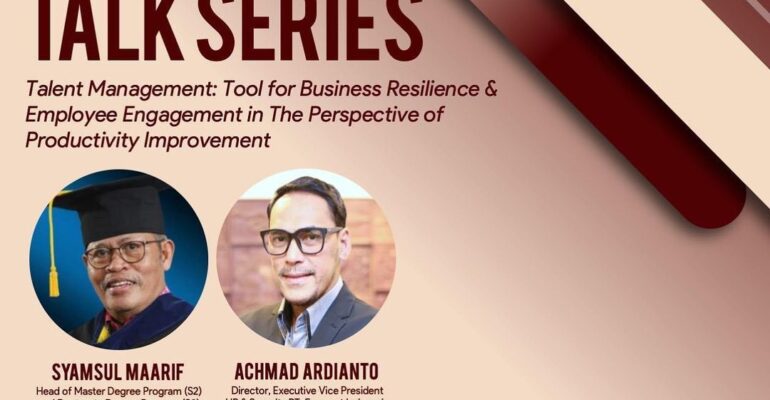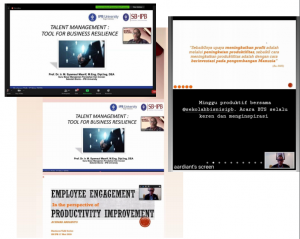SB-IPB BUSINESS TALK SERIES #3: “Talent Management: Tool for Business Resilience & Employee Engagement in The Perspective of Productivity Improvement”

SB-IPB BUSINESS TALK SERIES #3: “Talent Management: Tool for Business Resilience & Employee Engagement in The Perspective of Productivity Improvement”
The third of Business Talk Series (BTS) was successfully carried out online on Sunday , 17 May 2020 with 400 participants. The theme discussed in this webinar was related to human resource management, namely “Talent Management: Tool for Business Resilience” and “Employee Engagement in The Perspective of Productivity Improvement” by inviting two speakers, namely Achmad Ardianto as Director, Executive Vice President of Human Resource and Security. PT Freeport Indonesia and Prof. Dr. Ir. Syamsul Ma’arif, M.Eng, Dipl.Ing, DEA as Chair of the SB IPB Postgraduate Study Program. The moderator for the third edition of BTS is Harri Kuswanda, who is the AVP Performance and Corporate Culture of BP Jamsostek.
Talent management is an important factor for businesses to survive and achieve business success. The resilience of a business is determined by its ability to adapt to environmental demands and changes that occur. The key to the success of an organization or business to survive lies in the quality possessed by human resources in it, starting from the individual level to the group level.
In business resilience, there are two important things to consider, namely market dependence (competitiveness) and industrial turbulence (speed of change). In the era of crisis due to the Covid-19 pandemic, this includes industrial turbulence, a very rapid change occurs in the business environment so that companies that are willing to survive must be able to quickly adapt.
Organizational failure is usually determined by the leadership or the nature of the organization itself. Talented people are those who are able to carry out organizational transformation and are oriented in the future. According to the informants, in an effort to deal with change, there are three main things, namely from humans, organizations and technology. However, the main key of these three things is in human quality.
Quality humans will create value for a good organization, and are able to use technology appropriately. Talented humans must abound in mindset, heart-set, and skill-set. Humans are intelligent, work sincerely, and are agile in carrying out their duties in an organization or business. Talent management is able to find and create talents that can detect future jobs. This kind of talent is able to capture, build, and apply knowledge that can be used to deal with crises that are not usually experienced by organizations or businesses because they are able to creatively detect things that can be done to overcome crises.
The topic presented by the second speaker was more specific about employee engagement in the perspective of increasing productivity. The orientation of the business is indeed profit (in broad terms, both for the company and the environment and society) which can be achieved by increasing productivity.
The best way to increase productivity is to invest in human resources. Basically, productivity is the output that a company produces from the inputs that the company must manage. According to Mr. Achmad Ardianto, talent is a part of input (which includes talent, machine, material, energy). Talent effectiveness is closely related to employee engagement (talent willingness) and employee enablement (talent ability). The most effective talents are those with high willingness and ability. The determinants of talent effectiveness, including enablement, are tools and environment, while engagement includes passion and skills. The four elements must be complemented by elements of leadership.
According to the informants, the most effective and efficient way to improve these elements is to increase leadership, so that other elements can be raised. A leader must be able to motivate, inspire, direct, support, empower, and be willing to be a role model. Currently, the leadership model must shift from a transactional to a transformational model.
It can be concluded from the discussion of these two speakers that proper human resource management is the key to success in maintaining and achieving organizational or business success even in times of crisis. The key to increasing the effectiveness of talented human resources from organizations or businesses is leadership that is oriented towards a transformational model.


